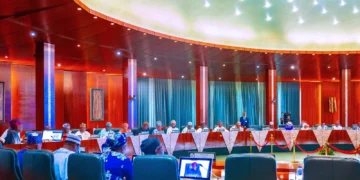Jos, the Plateau State capital is wearing a new and beautiful look following the new administration s move to decongest and ensure free flow of traffic. The Jos Metropolitan Development Board,JMDB, headed the young Hart Bankard is enforcing the instructions of Executive Order 3 to achieve that.
Prof Nankap Elias of the Centre for Conflict management and Peace Studies, University of Jos, gave a critical analysis of the import of the Executive Order which i feel our readers and the general public to know and appreciate.
Hear him: The Plateau State Governor Caleb Mutfwangs’ recent Executive order imposing a ban on trucks and heavy-duty vehicles from operating within the Jos and Bukuru metropolis during the daytime has sparked a wave of positive changes in the region. While I may not be intimately familiar with all the specifics of this Executive order, its tangible effects on the orderliness and efficiency of traffic in Jos and Bukuru are undeniable. In this paper, I express my satisfaction with this initiative, drawing parallels with similar traffic management measures implemented in Europe and America and advocating for other Nigerian states to follow suit.
Plateau State’s decision to restrict the movement of trucks and heavy-duty vehicles during the day in Jos and Bukuru has significantly improved the traffic situation in the region. The once chaotic and congested streets have now become more navigable and orderly, allowing for smoother movement of vehicles and pedestrians alike. This has not only reduced travel times but has also enhanced road safety and reduced the likelihood of accidents.
One of the most noticeable outcomes of this Executive order is the reduction in traffic jams and gridlocks that were previously commonplace in Jos and Bukuru. With fewer large vehicles clogging the roads during peak hours, commuters can now traverse the city more efficiently, leading to increased productivity and economic activities. Businesses have also reported improved logistics and delivery processes, as transportation routes have become more predictable and streamlined.
The success of Plateau State’s Executive order mirrors similar initiatives undertaken in cities across Europe and America. For instance, cities like London, Paris, and New York have implemented congestion pricing schemes, restricted zones for certain vehicles, and designated delivery hours to manage traffic flow effectively. These measures have not only reduced congestion but have also contributed to lower pollution levels and enhanced overall urban livability.
In London, the introduction of the Congestion Charge Zone has led to a significant decrease in traffic congestion and air pollution. Similarly, Paris’ efforts to promote cycling and pedestrian-friendly infrastructure have transformed the city’s transportation landscape, making it more sustainable and efficient. American cities like New York have also seen improvements in traffic management through initiatives such as carpool lanes, public transit expansions, and smart traffic management systems.
The positive outcomes witnessed in Plateau State following the implementation of the Executive order should serve as a model for other states in Nigeria facing similar traffic challenges. Urban centers like Lagos, Abuja, Port Harcourt, and Kano can benefit immensely from adopting similar traffic management strategies tailored to their unique needs and circumstances.
By restricting the movement of heavy-duty vehicles during peak hours, promoting public transportation alternatives, and investing in smart traffic technologies, Nigerian cities can alleviate congestion, reduce emissions, and improve the overall quality of life for residents. Moreover, such measures can attract investment, boost economic activities, and enhance the image of these cities on a global scale.
I commend Plateau State Governor, Caleb Mutfwang for his proactive approach to traffic management through the Executive order banning trucks and heavy-duty vehicles from operating within Jos and Bukuru during the daytime. The positive impact of this initiative on traffic flow, safety, and overall urban efficiency cannot be overstated. I urge other states in Nigeria to emulate this gesture and prioritize sustainable and effective traffic management strategies to create more livable and vibrant cities across the country.





